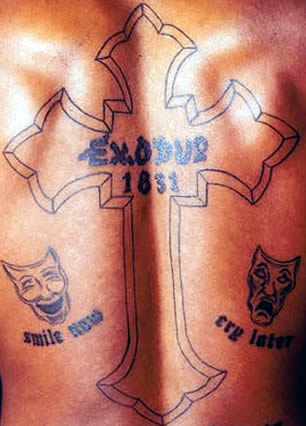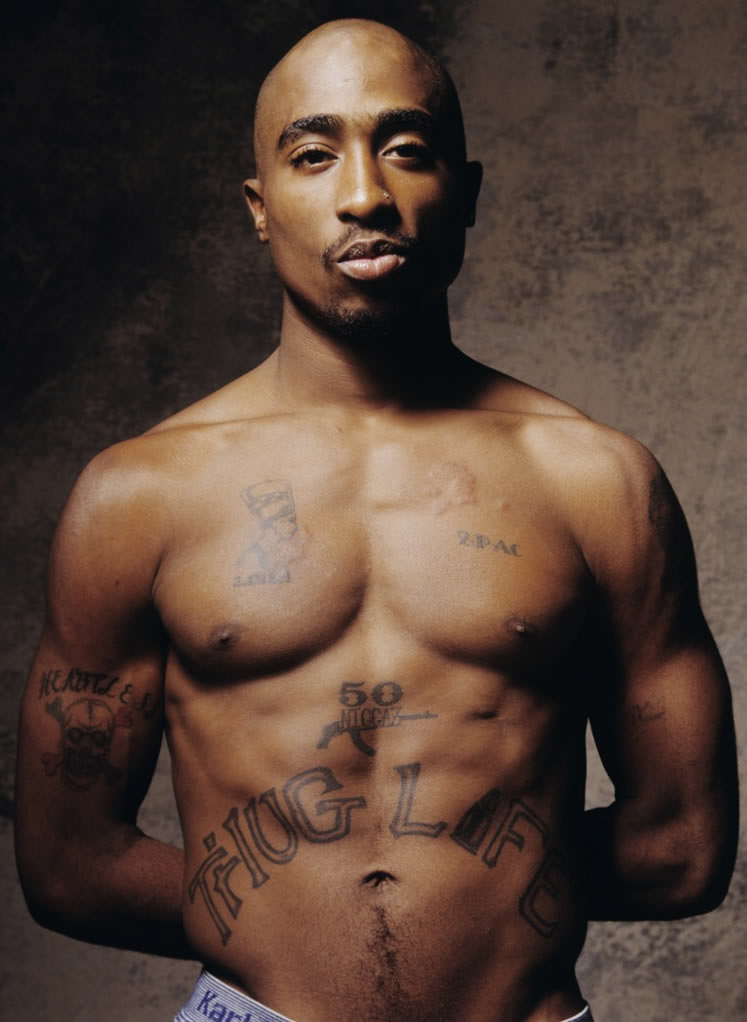
Tupac Shakur, widely regarded as one of the most influential artists in hip-hop history, not only left an indelible mark on the music industry but also on the world of body art. His tattoos, which covered a large portion of his body, were symbolic, personal, and reflective of his turbulent life, his beliefs, and his experiences. The meaning behind Tupac’s tattoos provides valuable insights into his identity and how he saw the world, as well as offering a glimpse into his complex personality.

Tupac’s Tattoos: A Reflection of His Life and Philosophy
Tupac’s tattoos were more than mere embellishments on his skin; they were deeply meaningful symbols that spoke to his personal struggles, aspirations, and ideologies. His body was essentially a canvas where each tattoo told a story. One of his most prominent tattoos was a Thug Life inscription on his stomach. This phrase, which became synonymous with Tupac himself, symbolized his belief in living life unapologetically, despite societal judgment. It was an expression of resilience against the adversities he faced, especially the systemic issues of racism and poverty that he often rapped about. The Thug Life tattoo was a statement of defiance, but also a declaration of solidarity with those who were marginalized and oppressed.

Tupac also had a tattoo of a cross on his back, signifying his connection to spirituality and his belief in a higher power. Despite his often rebellious attitude, Tupac spoke frequently about his religious views, and the cross was a reminder of his inner struggles and search for meaning in a chaotic world. His faith was a contradiction to the Thug Life ideology, indicating that Tupac’s character was multi-faceted, torn between the violence of his environment and his desire for redemption.
Another tattoo that garnered significant attention was the image of a black panther on his upper arm. The black panther was an iconic symbol of the Black Panther Party, a political organization dedicated to the empowerment of African Americans. This tattoo reflected Tupac’s admiration for the group’s fight for civil rights and social justice. It also connected him to a broader legacy of activism, as he often used his platform to speak out against racial inequality, police brutality, and systemic oppression.
Tupac’s other tattoos included the names of loved ones, such as his mother, Afeni Shakur, whose name he had tattooed on his chest as a tribute to the strong woman who raised him. This tattoo symbolized the profound influence his mother had on his life and his deep respect for her. Additionally, Tupac had the words “Only God Can Judge Me” inked on his chest. This phrase was a declaration of his belief in personal autonomy, rejecting societal judgment and embracing the idea that only a higher power had the right to determine his worth.
The Legacy of Tupac’s Tattoos
Tupac’s tattoos were a window into his complex and multifaceted personality. His body art became a symbol of his journey—both the triumphs and the struggles he faced. From the Thug Life tattoo to the cross and the Black Panther symbol, Tupac’s tattoos were a physical representation of his inner beliefs and the personal battles he fought.
After his death in 1996, Tupac’s tattoos continued to resonate with fans and artists alike. His tattoos represented more than just an aesthetic choice; they were a testament to his beliefs, his pain, and his fight for justice. Today, Tupac remains an enduring figure in popular culture, and his tattoos remain iconic symbols of his legacy. Each tattoo, in its own way, tells the story of a man who was not only a prolific rapper and actor but also a thinker, a fighter, and an individual who sought meaning in a world full of contradictions. His tattoos, now immortalized, continue to serve as a reminder of his powerful influence and the depth of his spirit.

Leave a Reply